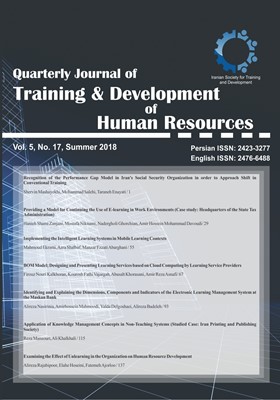Investigating the Role and Importance of Chief Knowledge Officers in Knowledge Management Development from the Point of View of Faculty Members (Case Study: Shahid Beheshti University)
Subject Areas :
Mahmoud Haghani
1
,
Mahmoud Abolghasemi
2
![]() ,
Elaheh Seyedmirza
3
,
Elaheh Seyedmirza
3
1 -
2 - دانشگاه شهید بهشتی
3 -
Keywords: Faculty Members, Chief Knowledge Officer, Knowledge Management, Shahid Beheshti University.,
Abstract :
The present study was conducted to investigate the role and importance of chief knowledge officers in knowledge management development at Shahid Beheshti University. Of a total of 831 academic staff a random sample of 135 was selected by Stratified Random Sampling method. To collect data, a researcher-made questionnaire was developed and validated by experts. Using quantitative approach, a descriptive correlational research was conducted. The 21 items of this questionnaire addressed the components of knowledge management (maintenance, acquisition, transfer, and application of knowledge) whereas other 19 items explored the impact of the chief knowledge officer. Research data were analyzed through Structural Equation Modeling (SEM). The results showed a significant relationship between the role of chief knowledge officer and the components of knowledge management. In the light of chief knowledge officers’ position, the most important factor was the application of knowledge then the knowledge acquisition variable، knowledge transfer، and knowledge preservation were influenced by the role of chief knowledge officers in knowledge management development.
1. Shafiee M, Mehdi R. Role and capacity building of fourth generation universities for local and regional development. Scientific Journal - Industry and University Press. 2017; 10(35):1-22.
2. Ghanbari S, Eskandari A. The Relationship between Knowledge Leadership and Intellectual Capital Management. Journal of Management. 2012;4(12):89-112.
3. Mosavi Khatir J, Naderi A, Abili K. The role of the Knowledge management mechanisms to improve innovation of Tehran public Universities. 2016;6(3):179-212.
4. Ghofrani P. Move to fourth-generation universities. Andisheha news. 2015; The News Code: 57326.
5. Awazu, Yukika and Desouza, Kevin CKnowledge Chiefs CKOs, CLOs and CPO. European Management Journal. 2004;22(3): 339-344.
6. Sisson Ph W, Ryan J J. C. H. New rationale for the need for CKOs long term: a systems perspective on observations. VINE Journal of Information and Knowledge Management Systems. 2017: 47(3).
7. Herschel R T, Nemati H. Chief Knowledge Officer: Critical Success Factors for Knowledge Managemen, Information Strategy. The Executive's Journal. 2000;16(4):37-45.
8. Capshaw S, Koulopoulos T M. Knowledge Leadership Information Management Magazine. 1999.
9. Mabey C, Kulich C, Lorenzi-Cioldi F. Knowledge leadership in global scientific research. The International Journal of Human Resource Management. 2012;23(12),2450-2467.
10. Vitala R. Towards knowledge leadership. Leadership & Organization Development Journal. 2004;25(6):528 – 544.
11. Poortamasbi S, Kazemi V, Rastin E, Hashemi H, Layeghi L. The Role of Knowledge Leaders in Knowledge-based Activities and Innovative Performance in Guilan University of Medical Sciences. Journal of Research in Psychology and Educational Sciences. 2018;28(3):103-120.
12. Harlow H D. Chief Knowledge Officers and Other Knowledge Management Executives Effect on Strategic Intent, Intellectual Capital Generation, and Firm Performance? An Empirical Research Study of Chief Knowledge Officers and Knowledge Executives in the USA. Electronic Journal of Knowledge Management. 2017;15(3):170-182.
13. Yang L R, Huang C F, Hsu T J. Knowledge leadership to improve project and organizational performance. International Journal of Project Management. 2014;32(1):40-53.
14. Migdadi M M. The Role of Effective Chief Knowledge Officer in Facilitating Knowledge Management. Journal of Information & Knowledge Management. 2016;15(4).
15. Nagarajan S, Ganesh K, Resmi A T, Anbuudayasankar S.P, Hemachitra R. Organisation structure, reward and communication design for implementation of knowledge management. Internatinal. Jornal of Productivity and Quality Management solutio. 2012;10 (1):40–68.
16. Mohammed A, Elrehail H, Alatailat M, Elci A. Knowledge management, decision-making styleand organizational performanc. Journal of Innovation& Knowledg. 2017.
17. Rabie A, Maali M. Investigating the Influential Barriers to Knowledge Management Activities and Providing Improvement Patterns in Higher Education Centers. Science and Technology Policy. 2012;5(1):1-16.
18. Farzaneh Kondori N, Shami Zanjani M, Manian A, Hasanzade A. Provides a framework for explaining the superiority of knowledge in a way that goes beyond learning. Research and Information Processing and Management. 2018;33(4):1431-1464.
19. Bertoldi B, Giachino CH, Rossotto C, Bitbol-Saba N. The role of a knowledge leader in a changing organizational environment. A conceptual framework drawn by an analysis of four large companies. Journal of Knowledge Management. 2017.
20. Perrin A. The practices of knowledge managers in Lafarge. Journal of Knowledge Management.2012;16(2):204 – 214.
21. Raub S, Lausanne HEC. Implementing Knowledge Management Three Strategies for Effective CKOs. European Management Journal. 2004;22(6):714–724.
22. DeTienne K B, Dyer G, Hoopes C, Harris S. Toward a Model of Effective Knowledge Management and Directions for Future Research: Culture, Leadership, and CKO. Journal of Leadership and Organizational Studies. 2004;10(4).
23. Chauk KC, Snyman M M M. Position and role of the chief knowledge officer in South Africa – a discrepancy between theory and practice. South African Journal of Information Management. 2003;5(1).
24. Bontis N. The Rising Star of the Chief Knowledge Officer. Ivey Business Journal. 2002.
25. Abdelhakim M, Abdeldayem M. The Role of Chief Knowledge Officer in Higher Education Quality: A Case Study from University of Dubai. 2009;35(4):498-511.


